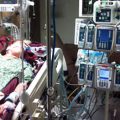Podcast: Play in new window | Download
Subscribe: Apple Podcasts | RSS
Hi, it’s Patrik Hutzel from INTENSIVECAREHOTLINE.COM where we instantly improve the lives for Families of critically ill Patients in Intensive Care, so that you can make informed decisions, have PEACE OF MIND, real power, real control and so that you can influence decision making fast, even if you’re not a doctor or a nurse in Intensive Care!
This is another episode of “YOUR QUESTIONS ANSWERED“ and in last week’s episode I answered another question from our readers and the question was
You can check out last week’s question by clicking on the link here.
In this week’s episode of “YOUR QUESTIONS ANSWERED” I want to answer questions from one of my clients Lara, as part of my 1:1 consulting and advocacy service! Lara’s mother is critically ill in ICU with hemorrhagic stroke. Despite showing some signs of improvement, the ICU team wants to stop feeding her. Lara is asking if it is a form of withdrawal of treatment?
My Mom is Critically Ill in ICU with a Brain Injury and the ICU Team Wants to Stop Feeding Her Without Our Consent. Is it a Form of Withdrawal of Treatment?

Patrik: Intensive Care Hotline, Patrik speaking. How can I help?
Lara: Oh, Hi. Good evening, Patrik. I’m just calling because I came across your website and actually my mother’s in hospital at the moment. She had a hemorrhagic stroke.
Patrik: Hemorrhagic stroke.
Lara: That’s right. Yeah. And we were told on the day that there’s nothing they can do because of the bleed size and she’d only last a day or two. But she’s already lasted nearly a week now and she’s showing really positive signs. So she’s showing signs she’s breathing by herself. Her right side is moving. She’s making just a little bit of noise, not too much. I mean, her eyes aren’t opening but she is responding to some commands. Like if I ask her, I’ve told her to raise her arm as a yes and keep it down as a no. So we thought she’s doing okay. But unfortunately, she’s caught pneumonia as well, so she’s on antibiotics.
We’ve been told that they’re helping, but they said that they’re not helping fast enough. So what they’ve said is she’s on a feeding tube now and they said that if the antibiotics aren’t working, then they’re going to stop the feed, which I think is really inhumane. It doesn’t make any sense.
RECOMMENDED:
- Membership for families in Intensive Care
- Book your free consultation call here
- Check out our Ebooks and videos
Patrik: Yeah, yeah. Are you the medical power of attorney for your mom?
Lara: Yes. Me and my cousin.
Patrik: Right. And how much research have you done to this point? Like, is this the first time you come across our website?
Lara: Yes.
Patrik: Have you subscribed to our free newsletter? I’m just trying to find out where are you at in terms of your research?
Lara: I’ve just come across your website and I don’t really have so much research. We’re just going by what the doctors are saying. And to me, it doesn’t seem right because if somebody’s alive and they’re breathing unaided and the heart’s beating unaided and they are showing some improvement, just because they’re not dealing with an infection so well, which I do understand can be critical, but that shouldn’t then mean that their food supply’s stopped. It makes no sense.
Patrik: That’s right. That’s right.
Lara: That’s right. And if they were a cancer patient and somebody told them that they had three days to live, you still wouldn’t stop giving them food or water.
Patrik: Absolutely. Absolutely. It’s inhumane. Is that your biggest frustration at the moment?
Lara: No, they’ve told us that they’re going to stop the feed if she’s not reacting well to the antibiotics, which I think makes no sense.
RECOMMENDED:
- THE 5 THINGS YOU NEED TO KNOW IF THE MEDICAL TEAM IN INTENSIVE CARE WANTS TO“LIMIT TREATMENT”, WANTS TO “WITHDRAW TREATMENT”, “WITHDRAW LIFE SUPPORT” OR WANTS TO ISSUE A “DNR” (DO NOT RESUSCITATE) OR “NFR” (NOT FOR RESUSCITATION) ORDER FOR YOUR CRITICALLY ILL LOVED ONE!
- “THE 5 QUESTIONS YOU NEED TO ASK WHEN THE INTENSIVE CARE TEAM IS TALKING ABOUT “FUTILITY OF TREATMENT”, “WITHDRAWAL OF LIFE SUPPORT” OR ABOUT “WITHDRAWAL OF TREATMENT!”
Patrik: We can help you with that. Yeah, we can help you with that.
Lara: You can?
Patrik: Oh, absolutely. How we work, from our perspective, we are a consulting and advocacy service, right? Myself, I have worked in intensive care for nearly 20 years. We know intensive care inside out. We know the politics, we know what’s happening in there. We know what they say to people and we know as a matter of fact what they actually need to do. But what they say and what they do is often not what they need to do because of their own agenda and also because the family is not asking the right questions.
Lara: Oh, that’s good.
Patrik: Yeah, yeah, yeah. So we’ve got several options, right? For example, we’ve got, sometimes people ask me to work with them one-on-one and I do some traveling, depending on the situation. Doesn’t sound like that’s necessary to you but just to give you the broader sort of picture. But in your case, I can help you over the phone and I’ve got a couple of options there. I have a seven-day option that gives you seven days, 24-hour access to me over the phone.
And it includes talking to the doctors, talking to the nurses, it includes participating in any meetings over the phone if you want me to be there and asking all the right questions. The biggest challenge for families in intensive care is that you don’t know what you don’t know. It’s a very specialised area and, at the moment, they can tell you whatever they want because you don’t know what questions to ask or you have a limited view of what questions you need to ask.
And again, we could use that hour, for example, half an hour talking about your situation. Another half an hour talking to the doctors or I could set you up with the right questions. I could set you up with what you need to do, or what do we need to do, to get your mother the right treatment. And what it comes down to really is making sure they are applying their own hospital policies, which they don’t at the moment. I can tell you straight away they’re not applying their own hospital policies. They are violating everything they are bound by and they get away with it because people don’t question, they don’t do their own research and they don’t get advocacy. You know that’s the bottom line.
Lara: Okay. Yeah, that makes complete sense because to us, what they said to us, it seemed … It’s not just inhumane, it makes absolutely no sense to stop somebody’s feeding tube when … I understand if the antibiotic doesn’t work then maybe you stop the antibiotic and then perhaps you can try again.
RECOMMENDED:
- What if you could reverse the Intensive Care team wanting to “pull the plug” or “withdraw treatment” on your critically ill loved one?
- THE 3 WAYS ON HOW TO TURN THE TABLES IN YOUR FAVOUR AND HAVE CONTROL, POWER AND INFLUENCE WHILST YOUR LOVED ONE IS CRITICALLY ILL IN INTENSIVE CARE!
Patrik: Absolutely.
Lara: I understand that if the stroke is severe, it is severe, we totally understand that too. But that has absolutely nothing to do with feeding somebody, especially when she was already underweight. It seems like it’s an opinion. Is that right? I mean, are they allowed to stop feeding somebody.
Patrik: Oh, it is an opinion. That’s what I’m saying. How we can help is … I tell you how it would work. If you and I were to get on the phone to one of the decision-makers there, I would question them about, number one, from what you’ve shared so far, I would need to know a lot more. For example, I would need to know also things like blood results. Like, is your mother still ventilated? What other medications she’s in?
Lara: No, she’s not. She’s not ventilated.
Patrik: Right, right.
Lara: And her CRP levels are … they’re improving slowly, which is obviously not ideal, but they are improving. And for a lady who has other gastric issues, which meant she lost a lot of weight. So for somebody who’s elderly and lost weight, for them to be slowly recovering, that’s absolutely normal.
RECOMMENDED:
- Is A Meaningful Recovery Possible When Your Critically Ill Loved One Is On The Brink Of Dying In Intensive Care?
- WHAT YOU AND YOUR FAMILY NEED TO DO IF YOUR CRITICALLY ILL LOVED ONE IS VERY SICK IN INTENSIVE CARE AND FACES AN UNCERTAIN FUTURE WITH THE POSSIBILITY OF FUTURE QUALITY OF LIFE IMPAIRMENTS.
Patrik: Oh, absolutely.
Lara: You can’t expect her to recover like a 20-year-old.
Patrik: Absolutely. Of course. How old is your mom?
Lara: She’s 73.
Patrik: 73. Yeah, that’s not very old.
Lara: That’s not, yeah.
Patrik: Now, as you said, it’s an opinion that they’re voicing and at the moment, with the information that you’ve shared. I don’t know how accurate that opinion is because I have limited clinical information. And once I’ve got the clinical information, then I can really guide you and I can also ask questions, or we can ask questions then and say, “Hey, have you done this? Have you done that? Why are you not doing this? Why are you not doing that?” You know? And that, again, your biggest challenge is you don’t-
Lara: Yeah, that makes sense.
Patrik: … you don’t know what to look for and you don’t know what questions to ask. Yes, you have definitely a basic understanding, but the devil is in the detail in a situation like that. For example, especially with the hemorrhagic stroke, I would also want to know what does the CT scan of the brain show? Has she had one?
Lara: I mean, they did show that to us. It was effective in three areas and they said it was a large bleed. But that’s fine, I understand. That’s a side … not a side issue but I understand that’s the main issue. But the fact that they said to us, after two days she wouldn’t do too well. We’re happy to have her back however, disability and any problems, and we want to help as much as we can.
RECOMMENDED:
- HOW TO COPE WHEN YOUR LOVED ONE IS CRITICALLY ILL IN INTENSIVE CARE!
- HOW TO STAY POSITIVE IF YOUR LOVED ONE IS CRITICALLY ILL IN INTENSIVE CARE!
Patrik: Yes, absolutely.
Lara: I mean, it might come to a point where the effect of that is too large, but that doesn’t mean that we stop helping somebody?
Patrik: Yeah, absolutely. Absolutely. Just because somebody may not have any perceived quality of life in the future, doesn’t mean you shouldn’t treat them. And again, it’s a perception of quality of life. It doesn’t necessarily reflect reality. You see, one of the challenges in intensive care is the doctors and to a degree the nurses as well, they’re the absolute experts in ICU. Right? But they’re not the experts in what’s happening when a patient leaves intensive care alive. They’re projecting something into the future that’s most likely inaccurate. Right?
Lara: Yeah.
Patrik: And again, what is quality of life? That is something that you and your family needs to decide, not the intensive care team.
Lara: Yeah.
Patrik: You know, we don’t know what your mother’s quality of life will look like in two days, two weeks, two months, let alone two years.
Lara: Yeah. That’s completely right. It’s just, I think they can make you feel like you don’t have many options.
Patrik: That’s right. That’s right. And you don’t, if you don’t start asking the right questions. They will walk all over you. That’s the reality. I mean, you’ve seen … I don’t know whether … Did you pay any attention to this whole James Middleton’s case a couple of months back in Manchester City?
Lara: Oh, yeah. Yeah.
Patrik: You know, I mean-
Lara: They’d done the same to him actually, where they stopped his feeding tube but they put it back on a day later, which was just ridiculous.
Patrik: Absolutely. We’ve done some advocacy work with the family there and it’s atrocious what was happening there. But they’ve done all the right things from their end. They started asking all the right questions and they surrounded themselves with a team that continued to advocate with them for James. And it’s completely ridiculous. At the end of the day, James was the prime example, it’s all about money. They don’t care about James or about anybody else. It’s all about money. It’s all about the beds they need. It’s all about how much this would cost if he was to go in the community or … That’s the bottom line. And if people don’t start asking the right questions, the sooner they will try and cease treatment.
Lara: Yeah, that’s completely right. So, I think I definitely need your help because I have everything in my head that I want to say, but to them it would just be me giving my opinion and being an upset relative as opposed to questioning them.
RECOMMENDED:
- 7 QUESTIONS YOU NEED TO ASK THE MOST SENIOR DOCTOR/ PHYSICIAN/ CONSULTANT IN INTENSIVE CARE IF YOUR LOVED ONE IS CRITICALLY ILL IN INTENSIVE CARE
- WHAT YOUR BODY LANGUAGE AND YOUR TONE OF VOICE COMMUNICATES TO THE INTENSIVE CARE TEAM AND WHY YOU NEED TO CHANGE IT URGENTLY SO YOU CAN HAVE PEACE OF MIND, CONTROL, POWER AND INFLUENCE!
Patrik: Absolutely. And how many days has it been now? I don’t think you mentioned that. How many days-
Lara: Well, it happened on Saturday evening and they told us that it would just be a couple of days. And she’s moving her left side just a little bit, which they didn’t expect. And I actually pulled the doctor, well not physically, but I made him come into the room and said, “Look, can you look at this?” And I was really … When you can tell from someone’s body language, it annoys me because he just seemed a bit shocked that we pointed something out.
And he was like, “Oh.” You know, like that. And I could tell that his personal opinion was that he was impressed. And then he said, “Oh, but we still need to remember the images that we saw.” So he was just going back because then they can just keep using that as an excuse. And that’s how it felt to me and I’m quite perceptive with people.
Patrik: Absolutely.
Lara: But it seems like he wasn’t … He was quite a nice guy actually. So he did … that’s when they put her on a feed because they weren’t giving her feed there and that’s when they started giving her antibiotics.
Patrik: And, tell me, who is the main driver of this from a medical perspective? Who are the people in office? Is it the neurologist, is it the intensive care specialist?
Lara: Yeah. Well actually, she’s in a stroke unit and it’s the consultant in charge. So they have meetings, all the doctors, every day. And I think it’s just the team as a whole. So just the consultancy team and the neurologist as well.
RECOMMENDED:
- THE 10 THINGS YOU DIDN’T KNOW ABOUT SEVERE HEAD OR BRAIN INJURIES (INCLUDING TRAUMATIC BRAIN INJURY AND STROKE) IN INTENSIVE CARE THAT YOU MUST KNOW, ESPECIALLY IF YOUR CRITICALLY ILL LOVED ONE ISN’T WAKING UP OR IF THE INTENSIVE CARE TEAM IS SUGGESTING A POOR PROGNOSIS OR EVEN WORSE, IF THE INTENSIVE CARE TEAM SUGGESTS A “WITHDRAWAL OF TREATMENT” OR A “LIMITATION OF TREATMENT!
- How to take control if your loved one has a severe brain injury and is critically ill in Intensive Care
Patrik: Right. And so when you’re saying she’s in the stroke unit, is she still in ICU or is she out of ICU?
Lara: She’s still in ICU-
Patrik: She’s in ICU, yeah, yeah.
Lara: … but she’s been moved to-
Patrik: To the stroke-
Lara: … Instead of a side room, she’s been moved to a shared room.
Patrik: And has there been any talk about DNR? Do you know what I mean by that?
Lara: DNR?
Patrik: Yeah. Do you know what I mean by that?
Lara: No, no, I don’t.
Patrik: DNR stands for Do Not Resuscitate. Do you know-
Lara: Yes. I think they did say … I think, yeah, they did say that on the first day.
Patrik: Okay, what did they say in particular?
Lara: They said, oh, because of the size of the blood leaks, that they wouldn’t … And that was immediate, they didn’t even give her a chance.
Patrik: That they wouldn’t resuscitate her?
Lara: Yeah.
Patrik: And did you just take that for face value? Did you question?
Lara: At the time, it was too stressful at the time. But, yeah, it is something I need to-
Patrik: Right. So we can help. And that’s the sort of thing we can help you with. Again, we have removed countless of DNR orders because again, we know, number one, we know where they’re going wrong in terms of how they go about it. And then number two, we know how to ask all the right clinical questions. The reality is that if this DNR order is on your mother’s file at the moment if your mother was to sustain a cardiac arrest if her heart was to stop, there wouldn’t resuscitate her because it’s documented and that document needs to be taken away as quickly as possible.
RECOMMENDED:
- 1:1Email counselling and consulting with Patrik
- 7 days unlimited 1:1 phone consulting and advocacy
- Membership for families in Intensive Care
- 1:1 phone and email counselling and consulting with Patrik
Lara: Okay.
Patrik: Those are all the things. They’re telling you this is a matter of fact, without giving you an option. They’re always framing things as “in the best interests of your mother,” while the reality is there’s a clear conflict of interest. Your best interest is your mother, their best interests is their beds, their staff, their budget management. That’s their agenda. Right? And they’re not telling you about it, but everything they’re communicating to you is framed around their agenda.
Are you there? Are you there? Hello? Hello?
The 1:1 consulting session will continue in next week’s episode.
How can you become the best advocate for your critically ill loved one, make informed decisions, get peace of mind, control, power and influence quickly, whilst your loved one is critically ill in Intensive Care?
You get to that all important feeling of making informed decisions, get PEACE OF MIND, CONTROL, POWER AND INFLUENCE when you download your FREE “INSTANT IMPACT” report NOW by entering your email below!
In Your FREE “INSTANT IMPACT” report you’ll learn quickly how to make informed decisions, get PEACE OF MIND, real power and real control and how you can influence decision making fast, whilst your loved one is critically ill in Intensive Care! Your FREE “INSTANT IMPACT” Report gives you in-depth insight that you must know whilst your loved one is critically ill or is even dying in Intensive Care!
Sign up and download your FREE “INSTANT IMPACT” REPORT now by entering your email below! In your FREE “INSTANT IMPACT” REPORT you’ll learn how to speak the “secret” Intensive Care language so that the doctors and the nurses know straight away that you are an insider and that you know and understand what’s really happening in Intensive Care! In your FREE report you’ll also discover
- How to ask the doctors and the nurses the right questions
- Discover the many competing interests in Intensive Care and how your critically ill loved one’s treatment may depend on those competing interests
- How to eliminate fear, frustration, stress, struggle and vulnerability even if your loved one is dying
- 5 mind blowing tips& strategies helping you to get on the right path to making informed decisions, get PEACE OF MIND, control, power and influence in your situation
- You’ll get real world examples that you can easily adapt to your and your critically ill loved one’s situation
- How to stop being intimidated by the Intensive Care team and how you will be seen as equals
- You’ll get crucial ‘behind the scenes’ insight so that you know and understand what is really happening in Intensive Care
- How you need to manage doctors and nurses in Intensive Care (it’s not what you think)
Thank you for tuning into this week’s YOUR QUESTIONS ANSWERED episode and I’ll see you again in another update next week!
Make sure you also check out our “blog” section for more tips and strategies or send me an email to [email protected] with your questions!
Also, have a look at our membership site INTENSIVECARESUPPORT.ORG for families of critically ill Patients in Intensive Care here.
Or you can call us! Find phone numbers on our contact tab.
Also check out our Ebook section where you get more Ebooks, Videos and Audio recordings and where you can also get 1:1 counselling/consulting with me via Skype, over the phone or via email by cmailto:https://intensivecarehotline.com/licking on the products tab!
This is Patrik Hutzel from INTENSIVECAREHOTLINE.COM and I’ll see you again next week with another update!







